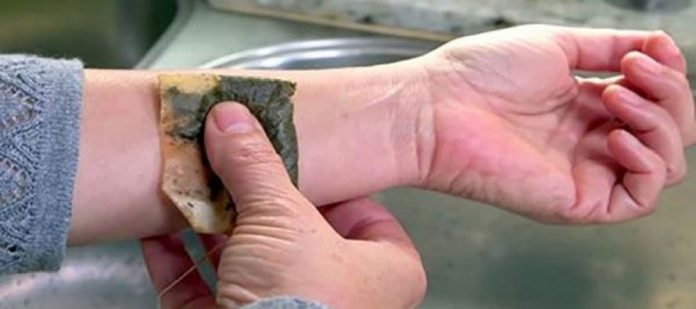The lymphatic system operates in much the same way as the circulatory system in the body. Working to fight infection and isolating bacteria from the rest of the body. As a result, areas all over your lymphatic system, known as your lymph nodes, can become sore and inflamed as part of an immune response.
Most of the time, if you experience swelling in your lymph nodes, it’s a sign that your immune system functions well enough to combat an infection. Occasionally, if your lymphatic system is overtaxed, it can use a bit of help to clear out the inflammation and return to healthy condition.
Conventionally, Lymphadenitis, or lymph node enlargement, is treated with antibiotics, or anti-inflammatory drugs. All of these choices may have adverse impacts and unintended side effects on the rest of the system. Antibiotics are perfect as a last resort for infection, even for mild lymphatic problems, if you can stop killing the beneficial bacteria in your body along with the pathogens, it is better to treat yourself of course.
1. Apple Cider Vinegar

Cider vinegar is a natural probiotic which also has anti-bacterial properties that help in the fight against infection. While it might seem easy to counter, cider vinegar works by encouraging the good bacteria in your body while helping to suppress the source of infection.
Apple cider vinegar is used as a lymphatic tonic by holistic health practitioners, to assist in lymphatic drainage, and for general body detoxification. You should take a tablespoon or two in a glass of water or juice 2-3 times a day.
Cider vinegar is most widely taken with raw honey. It also has antibacterial properties and can triple the vinegar’s impact. A popular holistic cider vinegar-based remedy, known as an oxymel, mixes one-part immune boosting herb, one-part cider vinegar with one-part raw honey. Taken together, this can help improve your immune system and flush the lymphatic system inflammation.
Related: All-Natural, Home Remedies for High Blood Pressure
2. Cold Compress vs. Hot Compress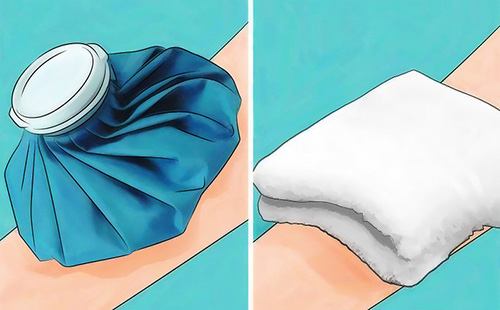
Ice packs and cold compresses help reduce local inflammation and are a great option for lymphatic isolation problems. To minimize swelling, apply a cold compress or ice pack wrapped in a towel for 15 for 20 minutes at a time a few times a day. Similarly, the elevating the area affected can also help remove the excess fluid.
Water is also a great relief of pain, so using a hot compress on sore and/or swollen lymph nodes will work wonders, so as long as you have access to hot water (doesn’t have to be much) and a flannel or cloth piece, you can create your own. Simply soak the flannel in hot water (not boiling for obvious reasons), squeeze out the excess water, keep it for several minutes over the affected area. The heat will increase blood flow, which in effect will relieve the pain and swelling.
3. Oregano

Clinically proven to have potent antibacterial properties, essential oregano oil is a powerful fighter against natural infection. Try oregano tea made with the oregano in your spice cabinet for a DIY homemade version in a pinch. If the oregano is as fresh as possible it’ll work better.
You can also make an oregano-infused oil by packing a jar of dried oregano and then covering it with a natural edible oil like olive oil. Strain the leaves and use the oregano oil in your cooking, or take it by the spoonful directly.
It is also an option to buy ready-made basic oregano oil, and to take it internally diluted with a little water.
4. Vitamin C
An all-natural booster of the immune system, vitamin C helps the body assist itself in times of stress, illness, or systemic inflammation. You may either take packaged capsules of vitamin C or take a more balanced approach and concentrate on consuming foods high in vitamin C, such as citrus, kale and strawberries.
5. Massage
Massaging the lymph nodes gently will help to promote lymph movement and reduce local inflammation. Having the blood circulating into individual swollen nodes may help to relieve pain and heal. Gentle self-massage on the inflammation site is usually successful for 5-10 minutes at a time.
For severe, lymphatic problems of the whole body, there is a specialized form of massage therapy called lymphatic drainage massage. Nurses are also trained in it to treat lymph edema in patients and also via conventional medical outlets it is known as a therapeutic procedure when other approaches are not successful. Look for a professional session from a local practitioner or do your research and try on yourself a few lymphatic drainage massage strokes.
#6. Peppermint Oil
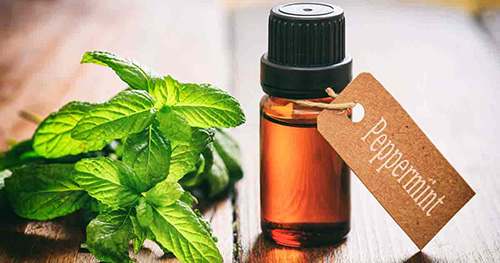
No home should be without a few essential oils, and they’re invaluable in times of shortage. Peppermint oil, which is massaged to the lymph nodes, acts in different ways – it is a natural analgesic (painkiller) and it is also antibacterial. Massaging the nodes would also improve circulation and decrease swelling, hence it is doubly beneficial to combine these two. Essential oils should always be diluted in a carrier oil and you can also benefit from its anti-inflammatory properties if you use castor oil (in combination with another vegetable-based oil, as castor oil is a bit thick). So you can make your own peppermint oil.
#7. Turmeric
When you’ve got cayenne pepper in your kitchen, chances are you’ll have turmeric, too. This golden powder contains both anti-inflammatory and anti-oxidant properties, which counter the infection that could cause the lymph nodes to swell. Turmeric and honey may be mixed in equal parts and applied 10 minutes to the affected area twice daily until symptoms subside. Alternatively, 1⁄2 tsp in a cup of warm water makes three times a day an efficient alternative to gargling. Turmeric powder may also be combined with milk, along with pepper, and brought to the boil, to taste before drinking with honey.
Related: 5 Home Remedies for Diarrhea
8. Raw Garlic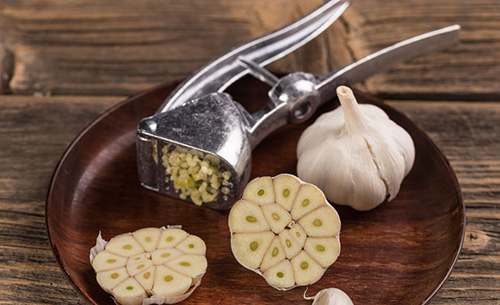
Naturally antibacterial, antiviral and antifungal, garlic allows the body to fend off infection while stimulating circulation at the same time. Raw garlic works best and finely slicing or crushing the cloves helps release the responsible enzymes which will most benefit your body. There are chopped varieties of garlic that you can buy in jars; but fresh is better because it will have the strongest enzymatic properties.
9. Honey and Lemon
One of the healing gods of nature, honey can be used for a multitude of conditions, but one of its best applications is for the symptoms of sore throats and swollen lymph nodes. It is not only soothing to drink hot tea with a tablespoon of honey (tea is a relaxant), but the honey can act to minimize swelling. Otherwise, 2 tbsp honey can be added to warm water and drink twice a day along with a healthy squeeze of lemon juice – while honey prevents swelling, lemon strengthens the immune system, and it is also antibacterial. Another way to use lemons is to cut the fruit in half, sprinkle salt and pepper onto one half, and then licking it! If you don’t really like that, squeeze the lemon juice in warm water and gargle.
10. Castor Oil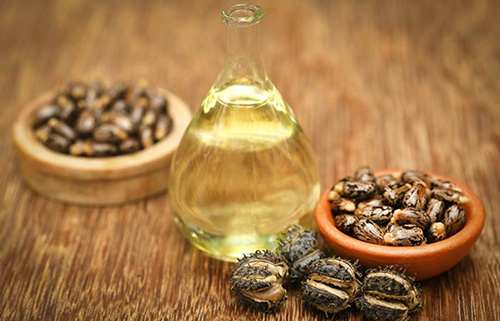
Castor oil contains anti-inflammatory compounds which help reduce inflammation when rubbed into the skin. Massage the area gently a few times per day with a small amount of castor oil. Avoid taking castor oil internally, as it can cause serious digestive distress.
11. Salt Water Gargles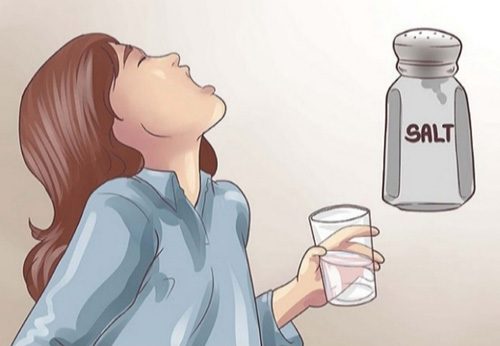
If the swollen lymph are mainly in your neck and throat, gargling with salt water can help to ease the inflammation. Just 1/2 teaspoon of salt dissolved in one cup of warm water may be adequate to stimulate the lymphatic system to reduce the inflammation around the neck and throat. Try gargling several times a day with a salt-water solution.
12. Herbal Teas
There are a variety of herbal teas that can improve the immune system and/or reduce inflammation. Mullein, echinacea, cleavers, elderberry, calendula, and peppermint. Take a few tablespoons of fresh or dried herb, finely chopped, and cover with 1 cup of boiling water. Steep for 10-15 minutes and drink 3 to 4 times a day plain or with a honey.
13. Tea Bags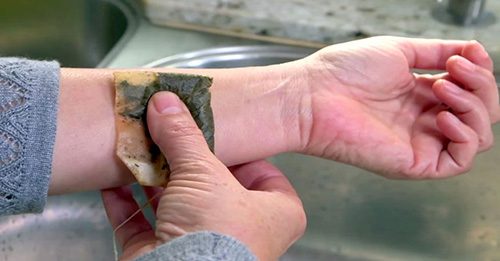
We all know a cup of tea makes things better, right? And this includes lymph nodes which are swollen. Soak a tea bag in hot water for a few minutes, then apply up to 3 times daily to reduce swelling and pain in the affected area. The tea bags can be either fresh or used, so there’s no need for waste – just use the ones you made tea with.
Related: 14 Powerful Natural Remedies For A Sinus Infection
14. Coconut Oil
No longer an exotic ingredient, coconut oil can be seen in many kitchens and cabinets for bathroom use. Coconut oil is antiviral, anti-inflammatory, and antibacterial, and is particularly effective in relieving swollen armpit lymph nodes. Massage of the oil over the affected area, treat the outer swelling, and/or take a tablespoon of extra-virgin coconut oil every day to work from within.


